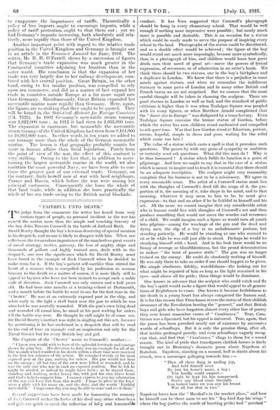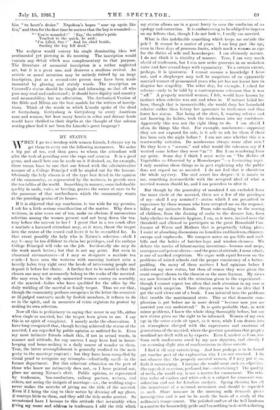" FAITHFUL UNTO DEATH."
F110 judge from the comments the writer has heard from very various types of people, no personal incident in the war has moved the nation more than the simple and touching bravery of
the boy John Travers Cornwell in the battle of Jutland Bank. Sir David Beatty thought the boy's heroism deserving of special mention in his despatch, and no one is likely to disagree with him. When one
effects on the tremendous importance of the numberless great events of naval strategy, tactics, gunnery, the loss of mighty ships and thousands of gallant and highly trained men, dealt with in the despatch, one sees the significance which Sir David Beatty must have found in the example of Jack Cornwell when he decided to make room for it. If the boy's patient self-sacrifice thus stirred the heart of a seaman who is compelled by his profession to assume bravery to the death as a matter of course, it is more likely still to appeal to laymen who have not been trained to accept such a noble code of devotion. Jack Cornwell was only sixteen and a half years old. He had been nine months at a training-school at Dartmouth, and a month before the battle he went to sea for the first time in the ' Chester.' He was at an extremely exposed post in the ship, and whon early in the fight a shell burst over the gun to which ho was attached he was mortally wounded. With the gun's crew lying dead
and wounded all round him, ho stood at his post waiting for orders CU the battle was over. Ho thought he still might be of some use. Sir David Beatty's instinct was right in singling out this act, because
by mentioning it ho has enshrined in a despatch that will be road to the end of time an example and an inspiration not only for the Naval Service but for every British boy and girl.
The Captain of the ' Chester' wrote to Cornwell's mother :-
" I know you would wish to hear of the splendid fortitude and courage shown by your boy. His devotion to duty was an example for all of us. The wounds which resulted in his death within a short time were received in the first few minutes of the action. He remained steady at his most exposed post at the gun, waiting for orders. His gun would not bear on the enemy ; all but two of the crew were killed or wounded, and he was the only one who was in such an exposed position. But he felt ho might be needed, as indeed he might have been ; . so he stayed there, standing and waiting, under heavy fire, with just his own brave heart and God's help to support him. I cannot express to you may admiration of the son you have lost from this world. I hope to place in the boys' mess a plate with his name on, and the date, and the words ' Faithful unto death.' I hope some day you may be able to come and see it there."
Several suggestions have been made for honouring the memory of Jack Cornwell so that the lustre of his deed may shine where boys
and girls are quick to catch the reflection of lofty and honourable
conduct. It has been suggested that Cornwell's photograph should be hung in every elementary school That would be well enough if nothing more impressive were possible ; but surely much
more is possible and desirable. This is an occasion for a statue which could be easily made to serve the purpose of inspiring every school in the land. Photographs of the statue could be distributed, and so a double effect would be achieved ; the figure of the boy would stand out much more imposingly, because more symbolically, than in a photograph of him, and children would learn how great deeds earn their meed of great art—move the powers of lyrical expression, of reverence, or of admiration in an artist's brain. We think there should be two statues, one in the boy's birthplace and a duplicate in London. We know that there is a prejudice in some minds against statues, and when we remember the indifferent statuary in some parts of London and in many other British and French towns we are not surprised. But we assume that the most careful thought will be taken in choosing the sculptor. There are good statues in London as well as bad, and the standard of public criticism is higher than it was when Trafalgar Square was peopled with its stony figures, or when Matthew Arnold complained that the " finest site in Europe " was disfigured by a truss factory. Even Trafalgar Square contains the bronze statue of Gordon, before which the writer has seen children stand enchanted and compelled to ask questions. Was that how Gordon stood at Khartum, patient, serene, hopeful, simple in dress and pose, waiting for the relief which came too late ?
The value of a statue which casts a spell is that it provokes such questions. The passer-by with any grain of sympathy or ambition or curiosity must ask questions. What did this man do ? Why is he thus honoured ? A statue which fulfils its function is a point of pilgrimage. And here we ought to say that in the case of a statue which is meant to inspire and to teach it is essential that there should be an adequate inscription. The sculptor might very reasonably complain that his business is not to be a missionary. We agree in every reasonable sense. The artist of a Cornwell statue must live with the thoughts of Cornwell's deed till the scope of it, the pro- portion of it, the meaning of it, take shape in his mind, and to that meaning, whatever it may seem to him to be, he must give expression—to that and no other if he be faithful to himself and his art. All the same, we cannot imagine that any considerable artist who is human could live with thoughts of Cornwell's act and then produce something that would not move the wonder and reverence of a child. We could imagine such a figure as would turn all youth into pilgrims—among the wreckage of the gun and the dead and dying men, the slip of a boy in no melodramatic pot;ture, but standing patiently. He would be standing as one who scorned to
sit or lie while he was still just able to stand. Perhaps he would be steadying himself with a hand. And in his look there would be no
frenzy of revenge or bloodthirstiness, but the proud determination to endure " the bout of passive strife." The gun was no longer trained on the enemy. He could do absolutely nothing of himself.
He was only there to take an order if one should happen to be given. His simple obedience, fidelity, watchfulness—the looking out for what might be required of him so long as the light remained in his eyes—and above all his pride; these things would be dominant.
One knows in advance that the sculptor who could catch and ffs the boy's spirit would make a figure that would appeal to all genera- tions of Englishmen to come. One knows it because faithfulness to the death in a young heart has always conquered the human souL It is for this reason that Frenchmen revere the statue of their childish drummer of the Revolution beating the " general," and that British boys and girls who have forgotten almost every other line of poetry they ever learnt remember verses of " Casabianca." True, Casa- Manes was a Spaniard, but his appeal is universal. True, again, that the poem has been parodied nearly out of existence by successive worlds of schoolboys. But it is only the genuine thing, after all, that invites prolonged parody, and even schoolboys vaguely recog- nize that, and find that " Casabianca " clings to them for a sound reason. The kind of pride that transfigures childish heroes is finely brought out in Browning's dramatic poem about Napoleon at Ratisbon. Napoleon, standing on a mound, half in doubt about his attack, sees a messenger galloping towards him :- "Then off there flung in smiling joy, And held himself erect
By just his horse's mane, a boy : You hardly could suspect— (So tight he kept his lips compressed,
Scarce any blood came through) You looked twice ere you saw his breast Was all but shot in two."
Napoleon hears how the " Marshal's in the market-place," and how he himself can be there anon to see his " flag-bird flap his wings "
where the boy (notice the words of bursting pride) had " perched " him " to heart's desire." Napoleon's hopes " soar up again like fire," and then for the first time he notices that the boy is wounded:—
"'You're wounded !" Nay,' the soldier's pride Touched to the quick, he said : `I'm killed, Sire !' And his chief beside, Smiling the boy fell dead."
The sculptor would convey his single dominating idea, not sentimental yet piercing in its meaning. The inscription would Contain any detail which was complementary to that purpose. The literature of memorial inscription is a rather neglected art, but it is a great one, and deserves a studious revival. An artistic or moral intention may be entirely ruined by an inept inscription, just as a second-rate person may have been made immortal by glowing and stately words. The inscription on Cornwell's statue should be simple and informing, so that all who pass may read and understand ; it should have dignity and sonority and memorability, but no affectation. The Authorized Version of the Bible and Milton are the best models for the writers of inscrip- tions. Think of the words in which Lincoln spoke of the dead at Gettysburg. Gettysburg is Gettysburg to every American man and woman, but how many hearts in other and distant lands would have thrilled to their depths at the thought of that solemn resting-place had it not been for Lincoln's great language?































 Previous page
Previous page